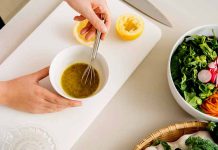
Most people have gradually switched to butter from oils. There are a host of cooking oils to choose from, but only a few of them are healthier than many others. Cooking oil manufacturers exaggeratedly make claims about health benefits, but are these oils really effective?
If you can’t be much sure, then don’t worry! We are here to help you. Let’s learn which cooking oils are the best and while which ones must be completely avoided.
Cooking Oils to Pick
1. Extra Virgin Olive Oil
Olive oil is basically a mono-saturated fat and it lowers low (LDL) or bad cholesterol and simultaneously, boosts high-density lipoprotein (HDL) or good cholesterol.
Additionally, extra virgin olive oil is high in antioxidants, known as polyphenols that are linked with superb heart health. Pure olive oil – which is not virgin –versions lack all these important qualities.
You can use extra virgin olive oil to enhance the flavor of your favorite dish. Mix it with salad dressings, drizzle a few drops over steamed vegetables or use it alone to sauté vegetables.
2. Canola Oil
Canola oil has a high smoke point (temperature at which oil begins to smoke) and a neutral flavor. These features make it an excellent choice for sautéing and baking.
When you grill or fry at higher temperatures, it is important to consider smoke point of an oil. At an oil’s smoke point, the nutrients are generally destroyed and harmful chemicals are produced.
Canola oil also offers an extended shelf life. It has relatively higher content of alpha-linolenic acids, i.e., omega-3 fatty acids and boosts heart health. You can use canola oil for baking, sautéing and making salad dressings.
Cooking Oils to Skip
1. Palm Oil
It is more common to find palm oil in many packaged foods as the heart-damaging trans fats are now being extensively replaced with the palm oil. Although palm oil manufacturers claim it to be trans-fat-free, the fact is that nearly half of its fat content is saturated. That adds around 1.5 grams saturated fat to every 2 tablespoons sized serving.
A diet rich in saturated fat increases cholesterol levels and possibly increases your risk of developing heart diseases. The best option is to choose natural products that are devoid of palm oil as well as trans fats.
Researches on animal models revealed that palmitic acid, a saturated fat found in palm oil, might make you eat more as it increases your resistance to appetite-suppressing hormones.
2. Soybean Oil
Soybean oil is usually labeled as primary ingredient in vegetable oil. It is high in omega-6 fatty acids that compete with healthy omega-3 fatty acids in your body. Omega-3 fatty acids are beneficial to both the brain and heart.
Many dietitians and nutrition experts reveal that Americans include too much omega-6 fatty acids in their diet; mostly from processed foods like dressings, mayonnaise, breads, crackers, pasta sauces and even granola bars.
Therefore, it is important to choose the right cooking oil, not only to boost your heart health, but to ensure overall wellbeing. It is also important to look out for these oils whenever you buy any processed food.










